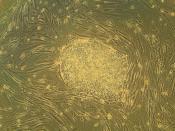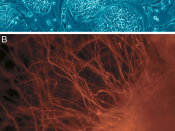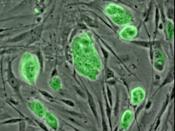What is a Stem Cell?
Research
Ethical Issues
Uses
Pros
Cons
References
Stem cells are usually very early stage cells which have the capacity to form into any specialised types of cells. Stem cell usually fall into one of three categories, these are;
* Embryonic stem cells - These are unclassified stem cells which are derived from a human embryo. These stem cells are particularly useful and controversial. They are unclassified which means that can be transformed into any type of cell, e.g. liver cells, skin cells, nerve cells. They are also controversial because obtaining them includes destroying a human embryo.
* Adult stem cells - Adult stem cells are stem cells, which are derived from specific cells and therefore are limited in there use. Adult stem cells are less controversial because they are able to be used without destroying what some people consider to be a human life, but they are restricted in the ways they can be used because they are classified cells.
* Umbilical cord stem cells - When a child is born, the umbilical cord attached to them can often contain some unclassified stem cells. These can be frozen and stored by a company and are particularly useful if the child has problems later in life.
Research
Stem cells have been around forever but serious research into them and their uses has only been around since 1998. Stem cell research has also been limited by ethical and cost issues.
Embryonic stem cells are required in two ways. The first is way of extraction is using fertilized embryos from fertility clinics. Usually there are leftover embryos when couples are tying to have a child. These in many cases are discarded so many scientist argue that using them for research is no different. The second way is...


